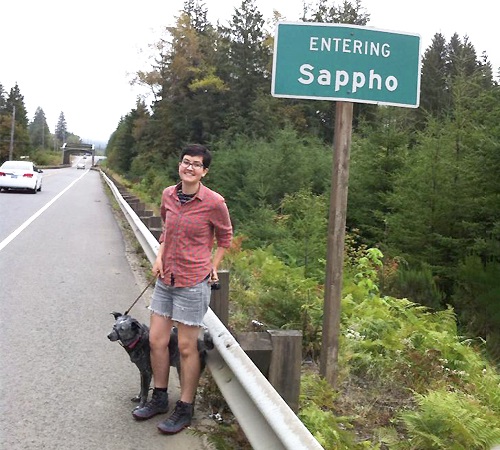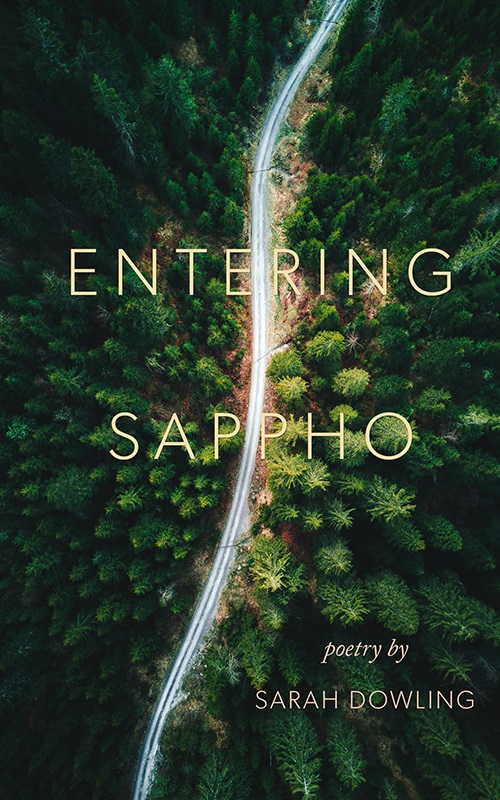In 2013 Sarah Dowling posed beside a small road sign in northern Washington State, unaware of the impact it would have.
The green sign read “Entering Sappho” which was in fact inaccurate because the town vanished decades ago. The small logging village that was first settled in 1895 eventually died by the end of the twentieth century, no one really knows exactly when. There’s not a single standing structure left.
Taking a photo beside the sign is somewhat of a pilgrimage for those who identify as queer, paying homage to the famous Greek poet from the island of Lesbos.
But for Dowling that sign, and the stories behind the small forgotten town, became the inspiration for her latest collection of poetry, also called Entering Sappho, that was recently shortlisted for the 2021 Derek Walcott Poetry Prize.

“When I actually did it, I was surprised by how I couldn't stop thinking about it,” says Dowling, an assistant professor at the Faculty of Arts & Science’s Centre for Comparative Literature, of snapping the photo. “It seemed so quaint that a group of farmers wanted to set up a new town and name it after an ancient Greek poet. That was such a lovely thing to me.”
But it also sparked thoughts of history, settlement and the sometimes bloody conflict that was part of creating a new town at the turn of the 19th century.
“So I thought is there a way to bring Sappho the poet together with Sappho the town in order to think about that history in a different way — combine the poet with the history of this strange little place and think about the broader phenomenon of settler colonialism.”
Dowling’s poems have a strong historical element, with her diving into the town’s historical archives, newspaper clippings and little-known memoirs from its residents — fascinating, quirky stories of growing up in this small rural town, according to Dowling.

Often such settlement memoirs fall into one of two categories — either they describe enduring tremendous hardship, or they are tales of heroics, with an “I conquered the wilderness” theme, she explains.
“But these looked a little different, the things people remember as children tend not to show up in other historical accounts,” says Dowling. “They focused on violent episodes between different settlers which was something I hadn't thought about. With all the financial and property incentives at stake, different settlers were lying and stealing from each other, and attacking each other.”
With such a violent history it’s somewhat ironic that the town’s founding family, who were great admirers of Sappho’s poetry, were called Lamoreux — French for ‘loving’ or ‘amorous.’
“It was sort of funny that they were interested in her in the first place,” says Dowling. “We think of Sappho as being this great poet of love and eroticism, so it's a strange coincidence that that was their family name when we look at this land grabbing violence with which the family is associated.”
In addition to the subject of love, much of Sappho’s poetry revolves around legacy and memory. “Sappho asks in her poetry, how will people in the future look back on us?” says Dowling. That led her to offer perspectives and pose similar questions when thinking about settlement and colonialism.
“It's a way for people to think about how we look back on the legacies of why we are where we are, and how we came to be where we are,” she says.
One of Dowling’s favourite poems of Entering Sappho is titled Us, drawing on one of these memoirs from a man who had been a child during the earliest moments of the town’s settlement.
This resident, along with relatives who provided illustrations, self-published his own short book about life in Sappho as a small child. It was full of interesting snapshots of his childhood, like having to order shoes through the mail.
“Sometimes the shoes would come in the wrong size after waiting for weeks, and all sorts of strange details like that which I found charming,” says Dowling. “And then suddenly, the next memory is something like, ‘And then our next door neighbor came out of the woods bloodied. Someone shot him in the head.’”
“I titled this poem Us, because on the one hand, it seems like this is a distant place and time,” says Dowling. “But in another way I see similar patterns echoing in the world around us every day. There are brutal episodes of horrible violence happening right beside us, or to some of us, that shatter the illusion that we're just playing and waiting for our shoes to come in the mail.”
However, Dowling also believes the death of the town of Sappho offers hope that from endings come new beginnings — it symbolizes possibilities for things changing and being different than they are now, though we don’t know what that will look like.
Says Dowling, “This one place came to an end, so maybe there are other things we can bring to an end as well in order to make something better in their place.”

